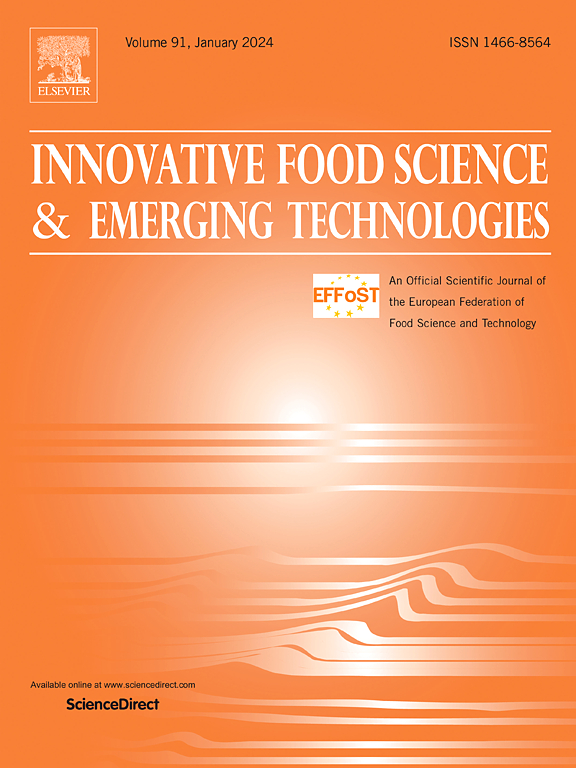Nutritional improvement of wheat grains and soybeans by solid-state fermentation with Pleurotus ostreatus mycelium
IF 6.3
1区 农林科学
Q1 FOOD SCIENCE & TECHNOLOGY
Innovative Food Science & Emerging Technologies
Pub Date : 2025-04-08
DOI:10.1016/j.ifset.2025.104021
引用次数: 0
Abstract
The nutritional quality of plant-based substrates can be improved through fungi-based fermentation. This study evaluates changes in the nutritional and non-nutritional composition of food substrates biotransformed with the edible mushroom Pleurotus ostreatus over time. The mycelium was cultivated on wheat grains or soybeans using solid-state fermentation, and the myceliated substrates were analyzed. Mycelium grows on both substrates but at a higher rate in wheat grains. Protein and phosphorus contents increase linearly with mycelial growth in both substrates, with final values up to 53 % and 36 % higher than the initial contents in wheat, while carbohydrates decrease linearly. Phytic acid shows a linear decrease, coinciding with 3- and 2-fold increases in wheat and soybean's acid-soluble/total phosphorous ratio. Phenolic content and antioxidant capacity increase in both myceliated substrates, fitting logistic growth models, with 7.8- and 4.8-fold increases in wheat. This study shows that solid-state fermentation with P. ostreatus can be applied to wheat and soybeans to enhance their content of valuable nutrients and bioactive compounds and to decrease their antinutrient content. Changes in both nutritional and non-nutritional composition are linked to the extent of mycelial growth, which can be reliably evaluated by simply measuring the percentage of substrate consumption.
平菇菌丝体固态发酵改善小麦和大豆的营养价值
通过真菌发酵可以提高植物基基质的营养品质。本研究评估了用平菇生物转化的食物基质的营养和非营养成分随时间的变化。采用固态发酵的方法在小麦和大豆上培养菌丝,并对菌丝产生的基质进行了分析。菌丝体在两种基质上均可生长,但在小麦籽粒中生长速度较快。两种基质的蛋白质和磷含量均随菌丝生长呈线性增加,最终值分别比小麦高53%和36%,而碳水化合物含量则呈线性下降。植酸呈线性下降,小麦和大豆的酸溶磷/总磷比值分别增加了3倍和2倍。两种菌丝体的酚含量和抗氧化能力均增加,符合logistic增长模型,小麦的酚含量和抗氧化能力分别增加了7.8倍和4.8倍。本研究表明,在小麦和大豆中应用固态发酵可以提高小麦和大豆中有价值的营养成分和生物活性化合物的含量,降低其抗营养成分的含量。营养和非营养成分的变化与菌丝生长的程度有关,而菌丝生长的程度可以通过简单地测量底物消耗的百分比来可靠地评估。
本文章由计算机程序翻译,如有差异,请以英文原文为准。
求助全文
约1分钟内获得全文
求助全文
来源期刊
CiteScore
12.00
自引率
6.10%
发文量
259
审稿时长
25 days
期刊介绍:
Innovative Food Science and Emerging Technologies (IFSET) aims to provide the highest quality original contributions and few, mainly upon invitation, reviews on and highly innovative developments in food science and emerging food process technologies. The significance of the results either for the science community or for industrial R&D groups must be specified. Papers submitted must be of highest scientific quality and only those advancing current scientific knowledge and understanding or with technical relevance will be considered.

 求助内容:
求助内容: 应助结果提醒方式:
应助结果提醒方式:


